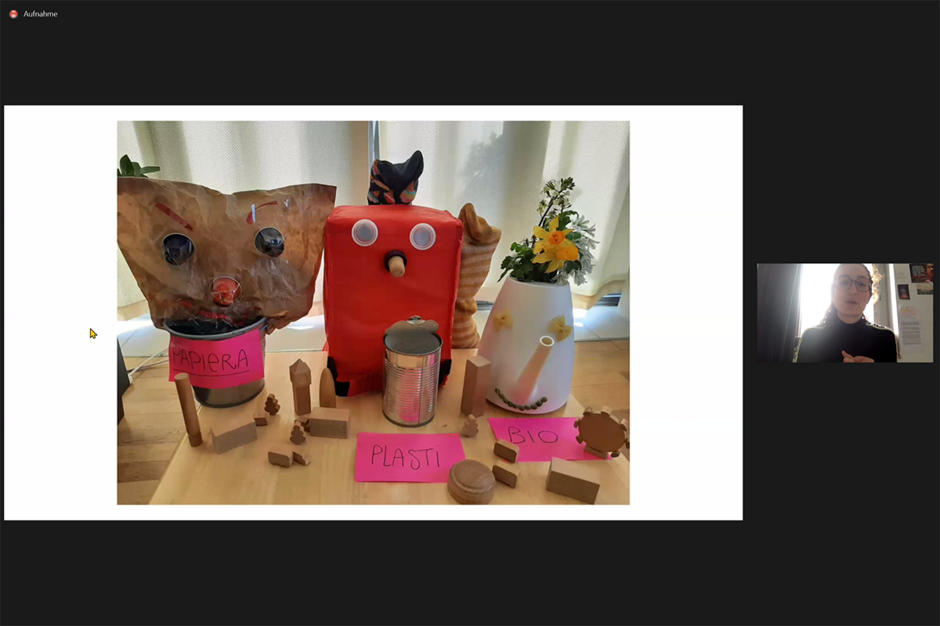Global Design Thinking Workshop: Reducing Plastic Waste with Innovative Ideas
In March 2022, HPI D-School hosted the Global Design Thinking Workshop "Designing for Global Impact" in cooperation with the Autonomous River Cleanup initiative. 37 students from 12 countries worked together with an international coaching team on a design challenge on plastic waste pollution.
Plastic pollution is a pervasive problem that affects communities around the world. On average, one million tons of plastic waste enters the oceans through rivers every year. How can we encourage people to stop polluting and take plastics back from nature? And how can we recycle plastic waste in a meaningful way?
At the GDTW in March 2022, six Design Thinking teams took on this challenge in the context of the United Nations Sustainable Development Goals. The methodological focus of the workshop was to develop human-centered solutions that also find answers to how social change can happen at the systems level.
During three intensive workshop weeks, the student teams developed ideas to address the global problem of plastic waste pollution. They also focused on exploring how to translate their proposed solutions into different local contexts to create a positive impact.
Creative ideas for reducing plastic waste.
Some of the teams developed prototypes for apps that, for example, invite people to take part in 'litter' challenges to keep their immediate neighborhood clean. In a fun way, the app shows users ways to reduce littering and use existing trash cans effectively.
Another app idea offers the option to upload personal shopping lists to show the most sustainable alternatives of sought-after products in the vicinity.
An idea has also emerged for an app that rewards households that recycle exceptionally neatly. This could incentivize proper waste separation in the neighborhood.
To show how much plastic waste is generated by a single purchase and how it can be avoided, one team constructed a "plastic checkout slip" that can be used at supermarket checkouts.
Another team focused on plastic reduction in meal deliveries and developed the idea for an integration that could allow delivery apps with a pickup service to deliver food in sustainable packaging.
Another prototype for bringing sustainability and plastic reduction further into the social spotlight is a video game that shows a dystopian future in the year 2072. Users could switch between this and today's reality and actively learn what future effect certain actions today will have.
In a similar vein, one team's idea is to be able to offset product purchases, similar to flights, while both showing the pollution created and providing a way to reduce one's environmental footprint.
Beyond the idea of sensitizing adults in their consumption, a team of students started earlier with their concept and proposes to make already children aware of waste separation and plastic reduction with the "Stories of the Garbage Monster". The basic idea here is to educate an entire generation in environmental awareness.
Many thanks to our project partner Autonomous River Cleanup for this important design challenge! Autonomous River Cleanup is a student-created initiative, supported by the Robotic System Lab at ETH Zurich, that aims to use innovation and technology to improve waste collection and recycling.
We thank our student teams and coaches for their dedicated participation in challenging times.
About the Global Design Thinking Workshops
In the Global Design Thinking Workshops (GDTW) program, participants experience Design Thinking not only as a process of this life-centered approach but also deal with complex innovation problems and a creative mindset in diverse teams. We offer three different workshops with a respective focus topic, which we deepen into: 01 Strategic Design: From Human-Centered Design to Strategic Futures, 02 Designing for Global Impact, 03 Teamed Leadership. We combine the work on a concrete innovation project with reflections on a specific topic. Our learning approach is based on the concept of problem-based experiential learning. We implement this approach as a project-oriented course in which the participants collaborate with a partner organization (NPOs and NGOs, large companies, SMEs, young start-ups, social organizations and public institutions).

![[Translate to Englisch:] Group Finals](/fileadmin/_processed_/c/6/csm_GDTW_Group_Finals_96931f76b9.png)
